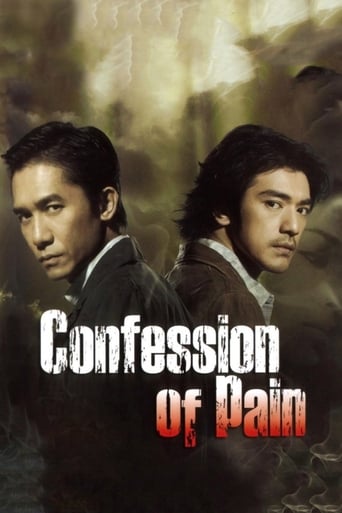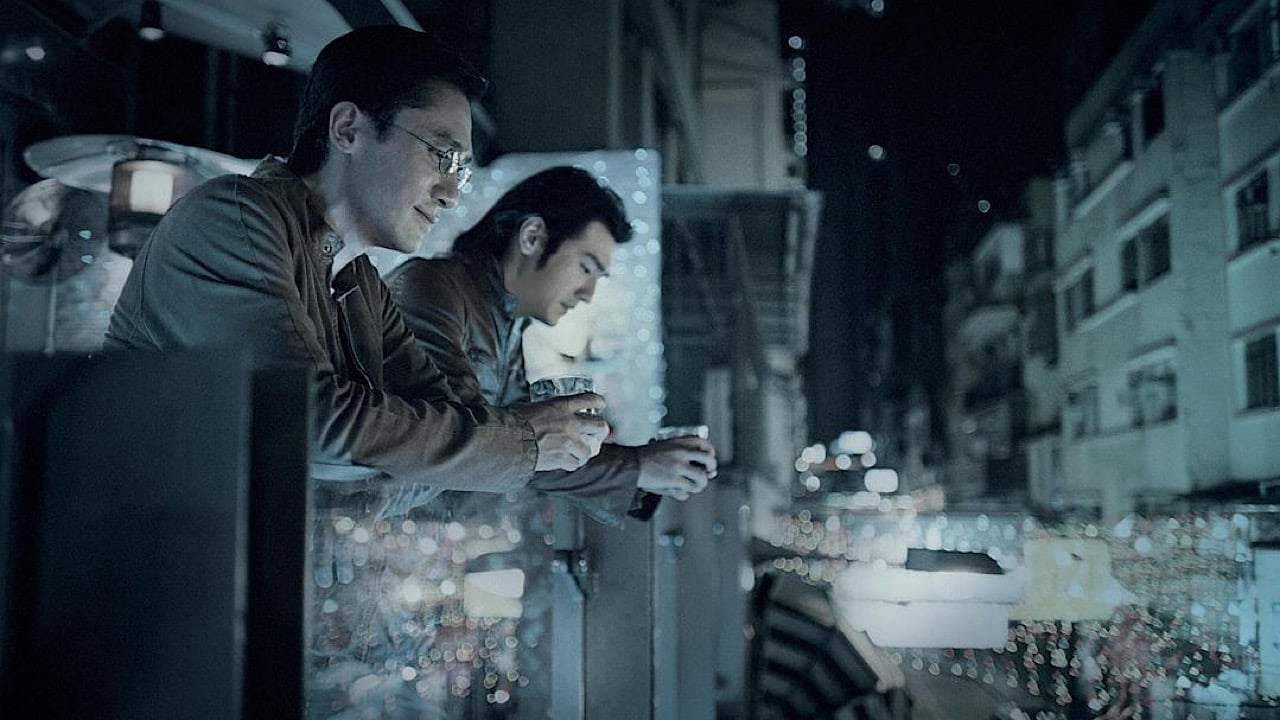shu-fen
Unresolved pain, harboured grudge and hatred leading to bloody revenge is most destructively tragic. Hei even takes harming/killing his wife as a last resort to fulfil his eye-for-eye, tooth-for-tooth dark plan on his father-in-law who exterminated his family twenty-five years ago.A "well-taken-care-of" work with who did it is known, how it was did is also known, and viewers chase and chase the line to know why he did that. Every area is fine but something missed... it lacks "power", some more energy and intensity is desired. The film is too "quiet", we need at least one exploding/imploding point to exhibit the tension. In addition, Fiona Sit should take the role of that that Shu-qi occupies here as the girl here is a dotty one. Shu-qi has long passed that playful age. Her talent is not developed her. Wrong choice of actress. And, Kaneshiro is not quite himself, I find no clue why.When the flame of hatred and pain keeps burning, the fire of vengeance grows stronger and hotter that even the entire furnace falls apart.
gabridl
This time of the relationship between Hong Kong and China. Andy Lau's "Internal Affairs" examined the roles with far greater interest. This time, though, Lau has sunk to the level of soap, which is sad to see, especially considering how sophisticated his previous work is. Shu Qi is criminally misused to boot. "Confession of Pain" in no way compares to "The Banquet," "Curse of the Golden Flower," "Mo Gong," "Three Times," all of which function on more than one level without sinking into the error of this film, which is not so much paranoia as mawkish self-absorption.As for camera work, set design, sound, and editing, this movie feels more like a commercial than a feature film. The effect is to cheapen what otherwise might have been great and deep. The same goes for the acting, which seems to have been texted in.
Lee Alon
Now here's a good waste of pent up potential, with one of the bigger Asian movies of the 2006 holiday season culminating in a largely uninspiring mixture of several elements that by all rights should have worked well together. At least the title is very apt for what transpires, though.With both Tony Leung Chiu Wai and Takeshi Kaneshiro throwing in their weight for this one, there seems no plausible reason for failure, as the two aren't only capable thespians and impressive on-screen, they've previously done good when working on the same project, to wit Chungking Express.However, this time around we are presented with a mediocre release that dabbles a bit too much in a wide array of influences ranging from crime sagas to supernatural thrillers. Confession of Pain (COP) actually nails none of those right smack on the head.It starts in 2003, presumably on Christmas Eve, as dashing detective Bong (Takeshi Kaneshiro) and his commanding officer Lau Ching Hei (Tony Leung) celebrate the festival by raising toasts and chasing down psychotic criminals. This is where you begin to notice that the movie needs to fess up to more than just it's title: so much is held back, it is as if audiences are expected to surmise literally everything on their own. Not necessarily a bad thing, but COP doesn't do very well with its hint-sprinkling, causing more frustration than anything else. And as every semi-intelligent moviegoer will tell you, most cases of this ilk inevitably lead to one obvious resolution or another, which certainly happens in this case.At any rate, these first scenes also showcase COP as a product very much endorsed by the Hong Kong government's infatuation with all things touristy, as car chases and other movements traverse the city's more glamorous and unique locales, even if geographically they don't always seem to make too much sense put next to each other like that.Following a few dark but celebratory successes, the story fast forwards three years to a present tense where Bong faces such tragedy he's moved to quitting the police and switching to the life of a perpetually drunk private eye. Conversely, the more disturbed Lau Ching Hei seems to have hit paydirt, marrying Susan, daughter of a rich businessman. She's done by excellent Xu Jinglei (Spring Subway, Dazzling, My Father and I), and forms the first half of this movie's dominant cast, the ladies. Her complement is Shu Qi, finally recovered from being a thin sliver in Three Times, and looking so sexy you can't get enough of her sweet, giggly portrayal of bar girl Fung. Although Xu Jinglei's northern, Beijing-derived manner isn't exactly at home in a Hong Kong-centric production (plus it's obvious she was dubbed over), Shu Qi's gorgeous visage, extensive Fragrant Harbor filmography and fluent Cantonese mean she's totally like a fish in water here.Without these two, COP would be close to a total loss. Fortunately, beyond the two female leads, it also possesses an uncanny knack for visceral violence. This is first evinced by a brutal sequence where Susan's wealthy dad gets clobbered over the head with a bronze Budha, with COP sparing us next to no detail. This continues in a few other scenes later on, and we commend directors Lau and Mak for deciding to go with it almost all the way.Another trait worthy of note is the film's unceasing attempt to throw viewers off. Important events are played and replayed from different perspectives on several occasions, and all seem perfectly reasonable as the story veers ever closer to a who dunnit. So, while COP is basically a blunt tale of violence, suffering, tragedy and revenge, it nonetheless attempts to rise above its simple building blocks with an almost clinical inability to stay still. Does this angle work? Not nearly as well as we would have liked it to. In the end, COP doesn't dish out enough interesting hints, red herrings, easter eggs or even crusty Christmas fruitcake to really intrigue. And even in the brief occasions when it does have you enthralled, the knowledge that sooner or later it'll all come crushing down precludes serious contemplation. This is no David Lynch outing.As mentioned before, none of the components introduced really get full play. Although Takeshi performs Bong to the best of his ability, and is once more a most likable actor, his relationship with Shu Qi's tantalizing Fung goes nowhere, as the girl pretty soon becomes little more than a comic relief sidekick. The police element isn't explored with any seriousness, featuring several cameos by Chapman To as a officer Tsui, a hapless fellow investigating the bizarre occurrences revolving Susan and her ersatz father. He adds very little to COP, something we regret. Tony Leung, on the other hand, was probably intended as a flatter character, and so we don't feel he was robbed of opportunity as much. Overall, he carries the aloof, surgical Lau Ching Hei with acceptable prowess.In the end, for something so apparently ambitious, COP gives you very little to take away and mull over, save for Shu Qi in tight jeans and minuscule outfits, but the less we know about what you do with that, the better. A more cohesive storyline would have been preferable, and of course injecting the thing with more elaborate, inventive conventions is high on the list of wish-they'd-thought-of-that's.To all intents and purposes, we are giving it a pass, yet with the females of the species looking so good and working so well in Confession of Pain, it's a guilty pleasure you may want to allow yourself this time of year.Rating: * * *
endlessdes
Confession of Pain Much like the acclaim Infernal Affair, however, this is less the drama and suspense. Tony Leung is detective Hei for the Hong Kong police force, Homicide department, and Takeshi (as Bong) is his colleague. The film begins with a routine investigation of a homicide case, trailing a suspect that is involved in a serial raping case. After the suspect hops in a taxi with a female companion from a bar during a Christmas celebration, the audience is able to enjoy an excellent choreography of car tailing, with careful art direction of scene shots.The heartbreaker occurs after the crime investigation, with Bong returning home in the morning and finds his girlfriend asleep in bed. At the start of the film, Bong had a causal conversation with Hei about the stale relationship mostly due to his insensitivity, unable to feel the passion to love his beloved. After some reflection, he steals a kiss and was horrific by her cold lips. Upon turning over the bed covers, he was shocked to find her wrists, both slash. The next scene jumps to the hospital when he realized his love was gone forever.The film fast-forward three years to 2006, where Bong had left the police force, striking out on his own as a private investigator, and also an alcoholic. Hei remains good friends with Bong, meeting up occasionally, and is married to Susan. Bong is still brooding over the lost of his love, drowning his pain through the many glasses of hard liquor which he once detested and conducting his own investigation on the motive of his love's suicide.Suddenly, there is a twist in the story; shown in black and white, as of a surveillance camera, the act of a gruesome crime perpetuated by Hei the murder of his father-in-law and his lackey. This was perhaps the act revealed to the audience, informing us of who is the villain, what remains, is the motive. Normal transmission resumes to the aftermath of the crime, with Susan in the police station assisting in the investigation. Susan was emotionless by the whole episode, perhaps due to her past misgivings towards her father, but suspected otherwise when the investigation reveals two burglars ransacking her father's mansion that there might be more than what the evidence shows. Because Hei was considered a suspect Susan's father was a tycoon and could not be in-charge of further investigation, Susan took the initiative and request Bong to conduct a private investigation, with the police assisting with archives of data.So the remaining part of the film reveals the cat and mouse game between Hei and Bong. The former covering his tracks, the latter revealing the motive of the unknown suspect.The pace seems to slow off by then, and with the villain shown at the start of it, only the element of motive why did Hei commit such a crime keeps the audience going. Cause and effect. Confession of Pain is an expression of pain felt by Hei and Bong; like Bong, his succumb to liquor to nullify the pain over his lost love, and the relentless pursuit for the truth of her death; like Hei, though the cold blooded murder of his father-in-law, his actions of deliberate precision carries much weighted thoughts and emotional pain, masked forever in him, barely revealed. The confession comes at the end, through each realization of the life each has, rather than wallowing in pain brought by memories of the past, the only path out of the vicious cycle is to look forward in life. Alas, only one of them can come out of it.Director Wai Keung Lau and Siu Fai Mak did a nice screenplay, but it was not as suspenseful as Infernal Affair, there seems to be some element missing, which slips my mind. Moreover, Tony Leung was quite deadpan throughout the film, and that leaves out his trademark charisma. Pity. The role should have been given to Andy Lau instead, and Tony could take over Takeshi's role not to discredit his acting, but it would be nice to see Andy and Tony tag team again since their last collaboration in Infernal Affairs.Ah, the missing element there is not a strong supporting role in the film to disperse the weight of the main actors.


 AD
AD



